Have you ever wondered how to cook eggplant that is delicious, non-oily, and with a nice purplish color?
Eggplant (also called aubergine) is challenging to cook well because it doesn’t have much flavor, quickly becomes soggy, and quickly loses its bright purplish color. However, if you flavor it correctly with the right seasonings, find a way to preserve its color, not to overcook it, it is a delightful dish for everyone.
My game plan
I use a few techniques to accomplish my goal in this recipe:
- Soak it with salt to reduce the amount of oil absorbed by the eggplant.
- Add vinegar to preserve its color.
- Pan-fry the eggplant first before cooking it with water to reduce the possibility of turning soggy.
- Use a Thai-style sauce with a strong savory flavor to season the relatively bland eggplant.
Let’s get into the details.
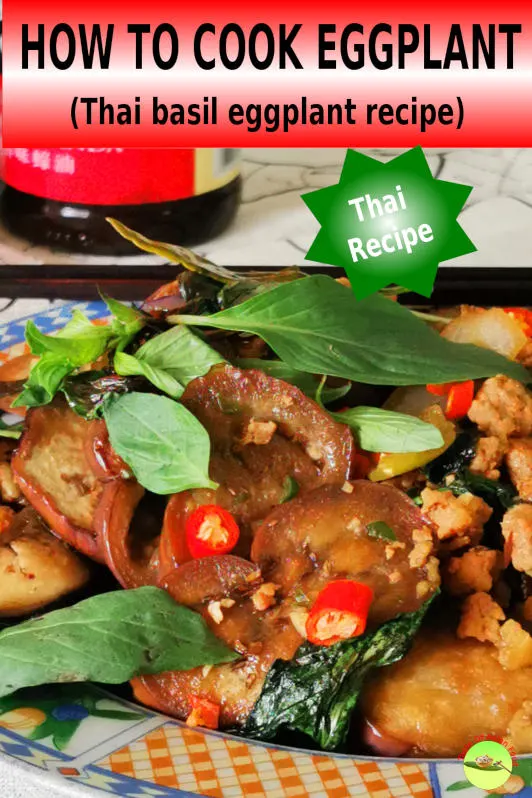
Note: This post may contain affiliate links. Please read my privacy policy for more info. I may receive commissions for purchases made through links in this post. As an Amazon Associate, I earn from qualifying purchases.
How to cook eggplant- a perfect Thai basil eggplant dish
Since I am not from Thailand, I am not here to show an authentic Thai dish. This is my Thai flavor interpretation with the Chinese stir-fry method. I live in Malaysia, which is a neighboring country of Thailand. Many Thai people live here, and Thai restaurants can be found at any nook and corner in town.
Here are the steps:
1. Soak the eggplants with salt and vinegar
Here is how to prepare the eggplant before cooking:
- You may want to cut the eggplants into wedges or any other shapes, but slice it into pieces because it is easier to arrange as a single layer in the pan in the next step.
- Put the eggplant slices in a container and fill with water just enough to immerse them.
- Add a teaspoon of salt and white vinegar to the water and let it stands for fifteen minutes.
- After soaking for 15 minutes, drain and dry the eggplant on a kitchen towel before pan-frying.
Salt helps to prevent the eggplant from absorbing too much oil during stir-frying or pan-frying. Vinegar helps to preserve the vibrant color of the eggplant. I have a more in-depth explanation of this topic in another eggplant recipe.
2. Pan-fried the eggplant
Pan-fry the eggplant with some cooking oil until it is slightly brown on both sides. This additional step before stir-frying serves two purposes:
- It adds extra flavor due to the browning effect.
- It cooks the eggplant partially and shortens the time required to stir-fry. As a result, the eggplant will not turn soggy and still holds its shape when served.
I prefer to pan-fry the eggplant with a non-stick pan because I want to use less oil. You can also achieve the same result by deep-frying the eggplants.
3. Prepare the Thai style sauce
This stir fry sauce is prepared with a combination of the Thai and Chinese seasonings.
The main components are the sweet soy sauce, fish sauce, and oyster sauce.
Besides that, I include sugar to balance the sourness of the vinegar I used to soak the eggplants. There is also ground white pepper and some cornstarch to thicken the sauce.
The preparation is straightforward. All I need is to mix all the ingredients in part B of the recipe. You can measure and add each separately while cooking, but I prefer to constitute it in advance because stir-frying is a quick flowing process.
4. Stir fry the minced meat
This recipe used eggplant and minced meat as the main ingredients. You can convert it into a vegetarian dish by removing the meat from the recipe and reduce the seasonings accordingly.
I am using minced pork in the recipe, but you can substitute it with chicken or beef.
Here are the steps:
- Heat some cooking oil in a pan or wok.
- Add the minced meat. Break the minced meat into small pieces with the spatula before it is cooked. It is easier to break it when it is still raw.
- Stir-fry over medium heat until it is fully cooked and turns fragrant.
5. Put it all together
Now it is just minutes away from serving it on the dining table.
- When the mincemeat is ready, add the onion, finely chopped bird’s eye chili, and the kaffir lime leaves. Stir-fry for half a minute.
- Add the sauce to the pan. When it starts to bubble and thicken, add the eggplant. Turn up the heat and stir-fry for another minute.
- Add the basil leaves to the eggplant. Keep stirring and flipping until the basil leaves shrivel.
- Check whether the eggplant is already fully cooked. If you think it is still too hard, add two tablespoons of water and continue cooking until it achieves the doneness that you want.
Now you can dish out immediately. Garnish with some chopped red chili and more fresh basil leaves. This Thai basil eggplant is best to serve with steamed rice.
Notes on some specific ingredients
Bird’s eye chilies
I am using bird’s-eye chilies, which are very hot. It is a type of small chili widely available in South East Asia.
It may be challenging to get this type of chili if you are not living in Asia. You can substitute it with three tablespoons of Thai chili paste, commonly available in the Asian grocery stores.
Note: Please adjust the hotness you prefer because the hotness level in this recipe is considered high.
Kaffir lime leaves
These leaves are popular in Thai and Malaysian cooking. I use it to prepare the Nyonya dish called Kapitan chicken and Thai green curry. Both dishes are typical in Malaysia, and I strongly recommend giving them a try.
If you cannot get the kaffir lime leaves, omit it since it will not affect the overall result.
Fish sauce
Fish sauce has a unique flavor and is hugely popular in Thai cuisine. It will not taste the same if you only use soy sauce alone.
I also use fish sauce in some Thai recipes, such as lemongrass chicken. Besides the lemongrass, fish sauce is one of the main ingredients.
Sweet soy sauce
I use sweet soy sauce in this recipe to balance the sourness of the vinegar. You need to add a little more sugar if you choose to use the Chinese light soy sauce.
Other eggplants recipes
Now I have shown you how to cook eggplant. Here are two easy eggplants recipe that you may want to try on this blog:
Chinese Eggplant Recipe – a simple recipe by deep-frying the eggplants first.
Eggplant with garlic sauce – a classic Szechuan recipe for eggplant with garlic.
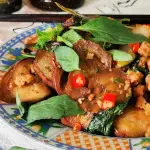
How to cook eggplant – an easy Thai basil eggplant recipe
This recipe uses the Thai basil eggplant as an example to show how to cook eggplant that is full of flavor, fresh in color, and not soggy.
Ingredients
To main ingredients (A)
- 300 g eggplant
- 1 tsp salt
- 1 tsp white vinegar
- 150g minced meat (pork or chicken)
The sauce (B)
- 1 tbsp sweet soy sauce
- 3 tbsp fish sauce
- 2 tsp oyster sauce
- 2 tsp sugar
- 1/2 tsp ground white pepper
- 1 tsp cornstarch
- 3 tbsp water
Others (C)
- 4 cloves garlic, coarsely chopped
- 1/2 onion, diced
- 4 bird's eyes chilies, finely chopped
- 2 kaffir lime leaves
- 1 cup basil leaves
- Red chili to garnish
Instructions
- Cut the eggplant into slices. Soak them in water with salt and vinegar. Let it stand for 15 minutes, then drain on a paper towel.
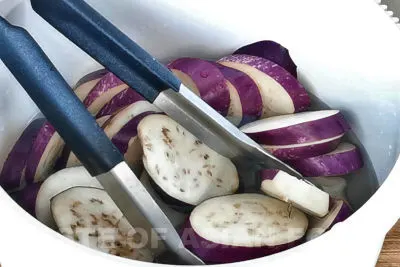
- Pan-fry the eggplant with some oil until both sides turn slightly brown.
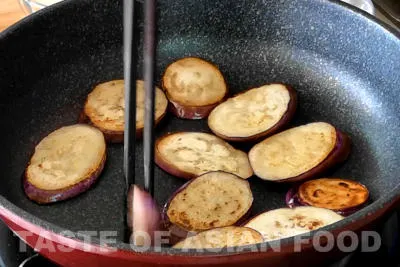
- Stir Fry the minced meat with some oil in a pan. When cooked, push it aside and add the chopped garlic, onions, kaffir lime leaves, and chopped bird's eye chili. When they become aromatic, add the sauce B.
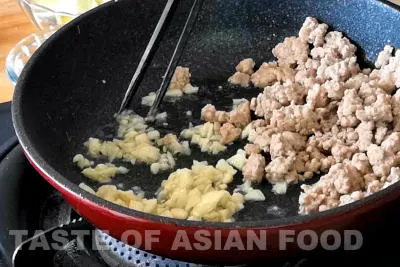
- Return the eggplant to the pan. Add some water and cook the eggplant until it is soft.
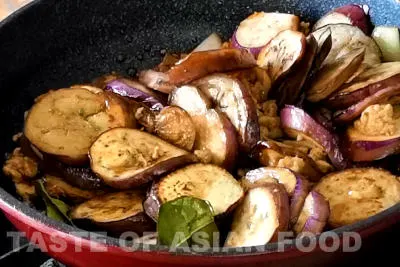
- Add a bunch of fresh basil leaves. Stir-fry until the leaves shrivel. Dish out and garnish with chopped red chili and more basil leaves.
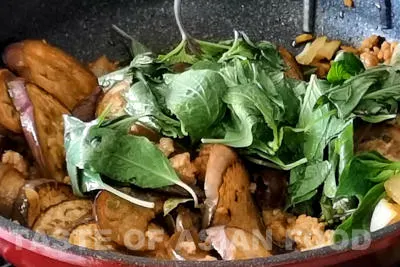
Recommended Products
As an Amazon Associate and member of other affiliate programs, I earn from qualifying purchases.
Nutrition Information:
Yield: 3 Serving Size: 1Amount Per Serving: Calories: 438Total Fat: 21gSaturated Fat: 7gTrans Fat: 0gUnsaturated Fat: 9gCholesterol: 78mgSodium: 3228mgCarbohydrates: 36gFiber: 5gSugar: 16gProtein: 30g
This data was provided and calculated by Nutritionix on 9/5/2020


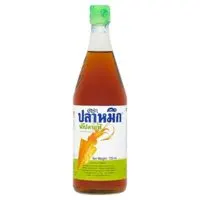

KP Kwan
Friday 4th of September 2020
Hi, this is KP Kwan. I am happy to see you in this comment area, as you have read through my recipe. I am pleased to reply to any questions and comments as soon as possible.